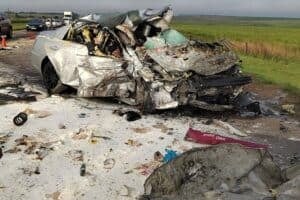Thekwane South, bordering the raging Crocodile River in Mbombela, is one of the most affected areas in the flood-hit Mpumalanga.

Residents of the flood-ravaged Thekwane South in Mbombela, Mpumalanga, are picking up the pieces of their lives after losing everything when the Crocodile River burst its banks last week.
When The Citizen arrived in the area this week, Nhlanhla Mathenjwa, whose entire house was flooded, was busy salvaging his belongings, including his children’s clothes and kitchen utensils in the mud along the river.
His wife and three children, aged between eight and 10, are currently staying with relatives as the floods have made their house inhabitable.
Watch: Aftermath of floods in Thekwane South, Mbombela
This video is no longer available.
“Almost everything is gone or damaged beyond repair. All my appliances; television set, fridge, radio and other appliances have either been swept away or covered in mud. Cupboards, beds and other household furniture have been damaged. Basically, besides these walls, I am left with nothing. All the groceries I bought for the month are also gone,” the 36-year-old said, with the river still roaring in his backyard.
Treacherous
Mathenjwa has had to move in with friends nearby as he has nothing to sleep on and almost his entire yard has been transformed into a treacherous mud pit.
The sheer force of the gushing floods also smashed all the windows of his house, forced the doors off their hinges and collapsed his neighbour’s perimeter wall into his yard.
“Luckily, no one was home when the flood struck; otherwise we would have been killed and washed away instantly. My wife was at work and the children at school while I was out meeting clients. I could not believe my eyes when I came back to find the destruction,” he said.
ALSO READ: Rivers in Kruger National Park now rising again
The sedan he was busy fixing was swung around in the force of the floods and is currently water-logged, with the interior covered in mud.

His neighbour, Senzo Mathaba, who lives with his wife, also lost everything in their house, including his VW Polo Gti that was in his garage.
Sheer devastation
The sales consultant, who was also not at home when the river burst its banks, said the floodwater was at the same level as his roof when he arrived.
“I saw on social media that our houses were flooded and I immediately headed home from Nelspruit. I almost fainted when I got here to find my entire house underwater,” the 37-year-old said, staring at the few belongings he managed to salvage.

ALSO READ: WATCH: Kruger Park warns visitors of closed roads and flooded bridges
Mathaba said the City of Mbombela was planning to demolish their houses but had not earmarked alternative land to relocate them.
He has spent more than R300 000 building his three-bedroom house. He had just finished over a year ago and was not about to allow it to be razed to the ground.
“Until I have concrete proof of alternative land, I am not going to allow them to tear down my house. If they insist, they must demolish my house with me inside,” he said.
His insurance had already towed away his car, which he said had been written off, when The Citizen arrived at his home.
Disaster management
The most affected houses are those close to the river. The local councillor reportedly warned the residents not to settle near the water, but no one heeded the warning.
Affected residents told The Citizen that they have been living along the river for over six years and the closest the water has come to their houses was about a kilometre away.
Some even suggested that there must have been a river or dam wall that broke upstream for the river to suddenly fill up and burst its banks to the extent it did.
City of Mbombela spokesperson Joseph Ngala said the affected households have conceded that they were not supposed to build on the flood line and that they have to move away from that area.
“The City is aware of the need for its residents to access serviced land for purposes of human settlements, but equally discourage residents from… invading land illegally,” he said.
Government has, in terms of the Disaster Management Act of 2002, declared a national state of disaster to enable an intensive, co-ordinated response to the impact of floods that are affecting Mpumalanga, the Eastern Cape, Gauteng, KwaZulu-Natal, Limpopo, the Northern Cape, and North West.
The National Disaster Management Centre has, in terms of Section 23 of the Disaster Management Act, classified the impact of current, above-normal rainfall in various parts of the country – with Mpumalanga and the Eastern Cape as the most affected – as a national disaster.
NOW READ: ‘Everything is under water,’ say farmers as heavy rain leaves trail of destruction across SA






